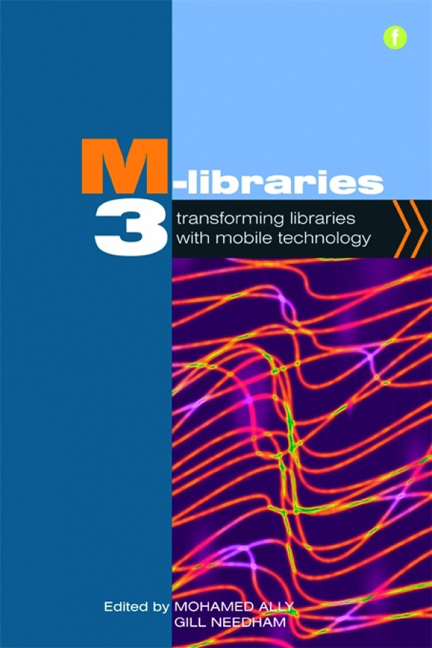Conclusion
Published online by Cambridge University Press: 08 June 2018
Summary
The chapters in this book present recent research and information on the use of mobile technology in libraries. The authors of these chapters are pioneers in their respective countries and are contributing to the advancement of the use of mobile technology to transform libraries. They are laying the groundwork for the libraries of the future in the mobile revolution.
As the educational system and society change, libraries need to change too, so as to continue to provide quality service to customers. The libraries of the future will not be the same as we experience them today. They will be transformed to provide access to 21st-century services. The transformation of libraries is needed for the following reasons:
1 The new generation that is entering the education system has different expectations from previous generations. In addition to the present generation, libraries will also have to cater for future generations.
2 Technology is changing rapidly, becoming smaller, more powerful, more virtual and more user friendly. A recent news article about changes in the smartphone market had the title ‘Don't Blink: you'll miss it’ (Canadian National Post, 2011). This describes very well the rapid changes in technology.
3 The internet is becoming faster as we move to Internet 2 and Internet 3. This will provide fast connectivity to people, especially those in remote locations.
4 The amount of information available for access is growing fast. According to Eric Schmidt, ‘every two days we create as much information as we did from the dawn of civilization up until 2003’ (Schmidt, 2010). This includes user-generated information using social software.
5 The education model is changing, moving away from group-based instruction and towards individualized instruction. There are initiatives around the world to establish online and virtual educational institutions, and existing group-based institutions are moving to blended learning that includes both online and face-toface instruction.
6 There is more emphasis on lifelong learning, since people will change careers frequently, and on the increasing availability of information. There are also initiatives around the world, such as the Millennium Development Goals, to provide education for all and to improve people's quality of life.
7 Learning for just-in-time application is taking the place of learning ‘just in case’ the information will be needed. Rather than sending employees to take an entire course, organizations are using e-learning and mobile learning to provide just-in-time training.
- Type
- Chapter
- Information
- M-Libraries 3Transforming libraries with mobile technology, pp. 197 - 200Publisher: FacetPrint publication year: 2012



